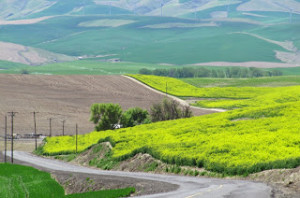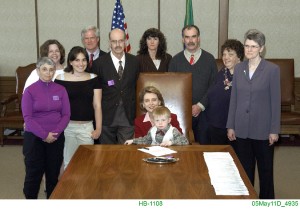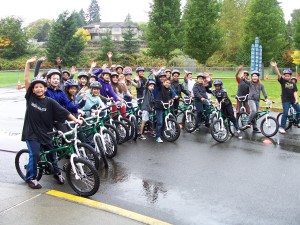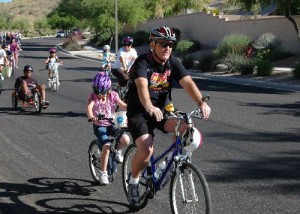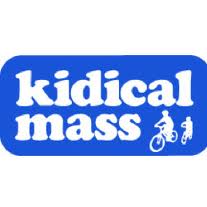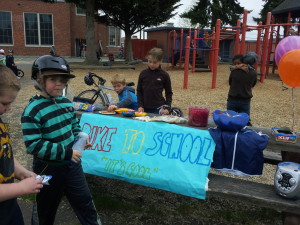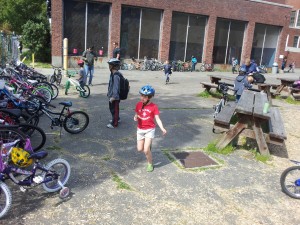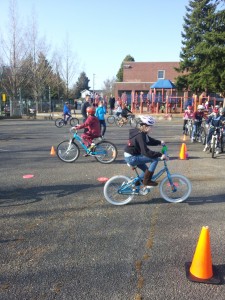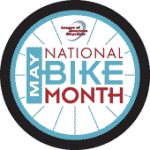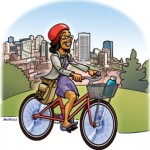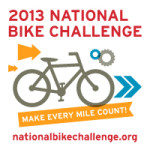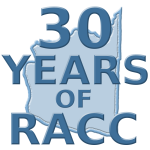Bike Month brings latest Bicycle Friendly States ranking from League of American Bicyclists
In honor of National Bike Month, the League has released its latest Bicycle Friendly States ranking. Washington state achieved the top ranking nationally for a sixth consecutive year (League Bike-Friendly-State 2013 Scorecard).
“I’m proud that Washington state has again claimed the mantle of the most bicycle-friendly state in America,” said Governor Jay Inslee. “Here in Washington, we recognize a 21st-century transportation system not only includes roads, rail, airports, transit, and ferries, but also bike lanes, sidewalks and trails. Bicycles create jobs, connect communities, and give Washingtonians healthier choices to get around.”
“We’re pleased to again be number one; bicycles play an important role in managing our transportation system,” said WSDOT Secretary Lynn Peterson. “As we continue to find efficiencies in our system, we look forward to partnering with organizations like Washington Bikes to improve safety and grow bicycling statewide.”
The Bicycle Friendly States Ranking is now more comprehensive than ever, capturing more information than ever before and delving more deeply into the issues embedded in becoming a more bicycle-friendly state. The League of American Bicyclists partnered with Washington Bikes to review and provide recommendations for next steps to make Washington’s streets safer and to grow bicycling statewide.
“We are encouraged to see significant progress in top states like Washington, Delaware, Colorado and Oregon,” said Andy Clarke, president of the League of American Bicyclists. “But, as the scores clearly highlight, there’s much work to be done in critical areas like infrastructure and planning in every state.”
Washington’s top ranking was based on a number of key indicators, including infrastructure and funding that provide on-the-ground bicycle facilities; education and encouragement programs that promote cycling; and passage and enforcement of bicycle-friendly laws that make it safe and comfortable for people of all ages to ride. While the state still has much more to do in making Washington’s roads safer for bicycling, this ranking recognizes Washington’s progress relative to the rest of the nation.
Washington state was recognized as a leader in using the previous federal Transportation Enhancement program and the new Transportation Alternatives federal program for bicycle and pedestrian projects; the League notes that other MAP-21 federal funding programs can be utilized to include biking and walking in all transportation projects.
The Bicycle Friendly States program is more than an annual assessment. Throughout the year, League staff will work actively with state officials and advocacy leaders to help Washington state identify and implement the programs, policies and campaigns that will improve conditions for bicyclists.
Our view at the Bicycle Alliance: We’re proud of Washington’s continued recognition as one of the best places to bicycle in the entire country. At the same time we will continue to work for improvement in how we identify and overcome barriers that keep people from riding, how we better collect and track data and then address issues around bicycle safety and collisions, and how we identify and prioritize opportunities for investment in non-motorized transportation.
To see how Washington ranked in the five evaluation categories and to learn more about the Bicycle Friendly States program, see www.bikeleague.org/states. For a list of Washington businesses, communities, and universities that have earned recognition from the League, see our Bike-Friendly Washington page.
About the Bicycle Friendly America Program
The Bicycle Friendly Community, Bicycle Friendly State, Bicycle Friendly Business and Bicycle Friendly University programs are generously supported by program partner Trek Bicycle. Learn more about the Bicycle Friendly America program at www.bikeleague.org/bfa.
About the League of American Bicyclists
The League of American Bicyclists promotes bicycling for fun, fitness and transportation, and works through advocacy and education for a bicycle-friendly America. The League represents the interests of America’s 57 million bicyclists, including its 300,000 members and affiliates. For more information or to support the League, visit www.bikeleague.org.
